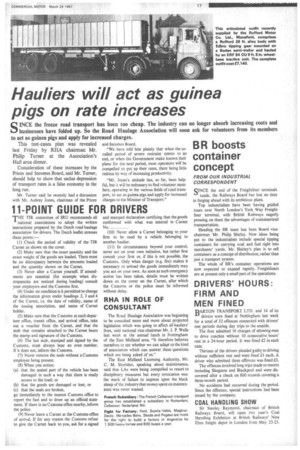11-POINT GUIDE FOR DRIVERS
Page 19

If you've noticed an error in this article please click here to report it so we can fix it.
THE TIR committee of IRU recommends all national associations to adopt the written instructions prepared by the Dutch road haulage association for drivers. The Dutch leaflet stresses these points:— (1) Check the period of validity of the T1R Carnet as shown on the cover.
(2) Make sure that the exact quantity and the exact weight of the goods are loaded. There must be no discrepancy between the amounts loaded and the quantity shown on the Carnet.
(3) Never alter a Carnet yourself. If amendments are essential (for example when discrepancies are noticed during loading) consult your employers and the Customs first.
(4) Under no condition is it permitted to change the information given under headings 2, 3 and 4 of the Carnet, i.e. the date of validity, name of the issuing association, and name of Carnet holder.
(5) Make sure that the Customs at each departure office, transit office, and arrival office, take Out a voucher from the Carnet, and that the stub that remains attached to the Carnet bears the stamp and signature of the Customs.
(6) The last stub, stamped and signed by the Customs, must always bear an even number. It' it does not, inform the Customs.
(7) Never remove the seals without a Customs employee being present.
(8) When you notice: (a) that the sealed part of the vehicle has been damaged in such a way that there is ready access to the load; or (b) that the goods are damaged or lost; or (c) that the seals are broken, go immediately to the nearest Customs office to report the fact and to draw up an official statement. If there is no Customs office nearby, inform the police.
(9) Never leave a Carnet at the Customs office of arrival. If for any reason the Customs refuse to give the Carnet back to you, ask for a signed and stamped declaration certifying that the goods conformed with what was entered in Carnet No.
(10) Never allow a Carnet belonging to your firm to be used by a vehicle belonging to another haulier.
(1 I) In circumstances beyond your control, never act on your own initiative, but rather first consult your firm or, if this is not possible, the Customs. Only when danger (e.g. fire) makes it necessary to unload the goods immediately may you act on your own. As soon as such emergency action has been taken, details must be written down on the cover on the Carnet, after which the Customs or the police must be informed without delay.








































































































